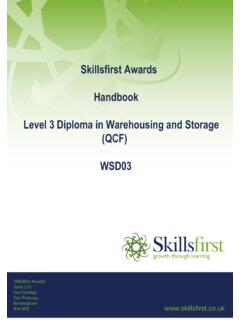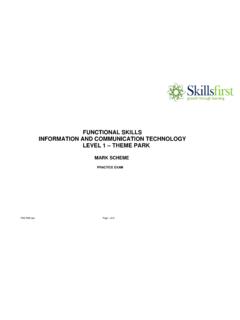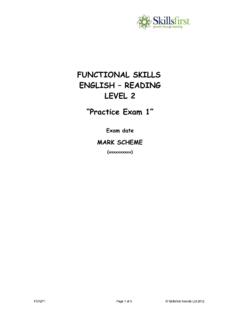Transcription of Skillsfirst Awards Handbook Level 3 Diploma in …
1 Suite 215 Fort DunlopFort Par kwayBirminghamB24 Skillsfirst Awards Handbook Level 3 Diploma in Children & Young People s Workforce (QCF) CYPD03 CYPD03 V5 280214 1 Contents Page Section 1 Introduction Introduction 2 What is the qualification and credit framework (QCF)
2 2 QCF units 2 QCF terminology 2 Section 2 Skillsfirst Awards Limited Data protection 3 Diversity and equality 3 Enquiries and information sources 3 Complaints and appeals 4 Malpractice and maladministration 4 Section 3 Aim and purpose of the qualification Level 3 Diploma 4 Qualification design 5 Continuing professional development (CPD) 5 Summary of assessment methods 5 Section 4 Qualification information Occupational expertise of those who assess performance, and moderate and verify assessments 6 Employer direct model 7 Learner entry requirements and progression 8 Guidance on providing evidence for the extended age ranges 9 Competence based units 9 Knowledge based units 9 Confidentiality, and images of minors being used as evidence 9 Section 5 Qualification structure Rules of combination 10 Section 6 Unit structure 10 Group A - mandatory units 15 Group B - early learning and childcare 60 Group C - social care 80 Group D - learning.
3 Development and support services 94 Group E - optional units 107 CYPD03 V5 280214 2 Introduction Skillsfirst Awards is an awarding organisation specialising in the provision of vocational qualifications across a range of occupational areas. Skillsfirst Awards recognises the need for industry to have fully trained and qualified staff reliably qualified to recognised industry standards. The following Handbook provides the learning outcomes and assessment strategy for the delivery of the Level 3 Diploma for the Children & Young People s Workforce (England) (QCF). The Handbook is a live document and will be updated should there be any incremental change made. Centres will be informed electronically when changes are made and it will be the responsibility of any recognised centre to ensure the most up to date version of the Handbook is used. The document also provides details of the administrative procedures, requirements and responsibilities that are associated with the delivery of vocational qualifications.
4 The Handbook is available on the Skillsfirst Awards website This document is copyright but can be copied by any of our recognised centres for the purpose of assessing learners and may also be copied by learners for their own use. What is the qualification and credit framework? The qualification and credit framework (QCF) is a new way of recognising achievement through the award of credit for units and qualifications. It will provide flexible routes to gaining full qualifications and enable qualifications to be achieved in smaller steps. Units within the framework will have a Level (ranging from entry Level to Level 8) to indicate the Level of difficulty. They will also have a credit value to indicate the size of the unit. The QCF will: allow providers to design more flexible programmes, suited to the needs of a wider range of learners describe achievements (credits) to employers, providers and learners in a way that is easy to understand allow learners to accumulate credit, by recognising smaller steps of learning at their own pace allow learners to transfer credits into an electronic learner achievement record, which they will keep for life QCF units Each unit has a credit value based on the total number of hours learning required to achieve it, (notional learning).
5 Each 10 hours of learning equals 1 credit, for example, if a unit takes 30 hours of learning, it will receive a credit value of 3. The units vary in credit value. In addition all units have a Level which may be different from the qualification in which they can be used. QCF terminology Whilst the evidence outcomes required from QCF and NVQ units are the same, the QCF units use different terminology to the NVQ units. The assessment criteria for NVQ units are listed under what you must do and what you must know whereas the QCF units are all listed under the learner can . CYPD03 V5 280214 3 Skillsfirst Awards Data protection Skillsfirst Awards takes the protection of data seriously and to this end has developed a data protection statement outlining how Skillsfirst and our centres, comply with the current legislation on data protection. It is important for centres to read our statement and ensure that our requirements are put in place. It is particularly important that centres make learners aware that data is shared with Skillsfirst Awards .
6 Our policy statement on this and data requirements can be found in our centre Handbook on our website Equality and accessibility Equality and accessibility Skillsfirst is committed to giving everyone who wants to gain one of our qualifications an equal opportunity of achieving it in line with current UK legislation and EU directives including the Equality Act (2010) and to ensure this occurs, has in place a policy on equality and accessibility which can be found on our website and within our centre Handbook . Skillsfirst will ensure that centres use a equality and accessibility policy that works together with ours and that they maintain an effective appeals procedure which along with the equality and accessibility policy, will be monitored by the external verifier. We expect centres to tell learners how to find and use their own equality and accessibility and appeals procedures. Access to assessment Skillsfirst Awards is committed to guaranteeing all learners are treated fairly and equally and to ensure this occurs, has in place a policy on reasonable adjustments and special considerations.
7 This policy states clearly what centres can and in some cases must, put in place to assist learners who may have particular requirements. We expect centres to tell learners how to find and use their own reasonable adjustments and special considerations policy and will monitor implementation through the external verification process. This policy can be accessed at and within our centre Handbook . Further advice on this policy and its application can be obtained from our customer services team at Enquiries and information sources Skillsfirst aims to provide accurate information in a variety of formats and media. Recognised centres are encouraged to make enquiries to the customer services team, or seek clarification from our website. Learners wishing to enquire about qualifications, aspects of qualifications or quality assurance policies and procedures are encouraged, in the first instance, to seek information from the recognised centre or their tutor/assessor. Where a satisfactory answer is unavailable, learners are encouraged to seek clarification from our website, or from the Skillsfirst customer services team.
8 As a guide, the majority of frequently requested information is available on our website or on request via the electronic helpline listed below. CYPD03 V5 280214 4 Website: email: Tel: 0121 270 5100 Fax: 0121 747 4102 In writing to: Customer Services Skillsfirst Awards Limited Suite 215 Fort Dunlop Fort Parkway Birmingham B24 9FD Complaints and appeals Complaints Skillsfirst Awards will endeavour at all times to satisfy our customer s needs and ensure a quality service. There may be times when our centres do not feel we have met these needs. Should they wish, centres may complain in writing to the Skillsfirst Awards customer services manager. We will attempt to resolve all complaints within the published timescales and will record and review all complaints as part of our ongoing customer service commitment. Appeals Skillsfirst Awards aims to ensure that at all times its decisions are fair, consistent and based on valid judgements. However, it is recognised that there may be occasions when a centre or a learner may wish to question a decision made.
9 Skillsfirst Awards therefore has an appeals policy and process which clearly indicates the rights of the centre and the learner to appeal against a range of decisions taken by Skillsfirst . The Skillsfirst Awards appeals policy and process can be accessed on our website and within our centre Handbook . Centres are required to have a documented policy and procedure which allows learners to question decisions made by the centre. The final stage of such a procedure may be to appeal to the Skillsfirst Awards external verifier. This policy would form part of the original centre recognition process and its implementation will be monitored by the external verifier. Malpractice and maladministration Skillsfirst Awards has a responsibility to ensure that malpractice and maladministration is addressed effectively and to publish procedures to centres for dealing with malpractice on the part of learners, centre staff and any others involved in providing the qualification. To meet this requirement, Skillsfirst Awards has a malpractice and maladministration policy and process, the details of which can be accessed on our website Aim and purpose of the qualification Level 3 Diploma The Level 3 Diploma aims to guide and assess development of knowledge and skills relating to early learning and childcare, social care and the learning development and support services workforces.
10 This qualification confirms competence in these areas where appropriate and serves as CYPD03 V5 280214 5 the required qualification (for all new practitioners) for registration and regulatory requirements in the qualification has been designed to: provide a broad background understanding of the children and young people s workforce sector and an introduction to the practical skills and knowledge required provide an awareness of the range of jobs and work settings in the children and young people s sector. enable learners to make an informed assessment of their own aptitude for work in this sector and to make informed decisions about careers encourage learners to reach a Level of knowledge and skills that will facilitate progress into further vocational learning or to potential employment in the sector introduce learners to the discipline of the working environment and to encourage mature attitudes to the community in general encourage learners to value continued learning and remain in the learning process allow learners to learn, develop and practise selected skills required for progression in the sector provide opportunities for progression to the relevant Level 4/5 Diplomas or Foundation/Honours Degrees in the sector.






